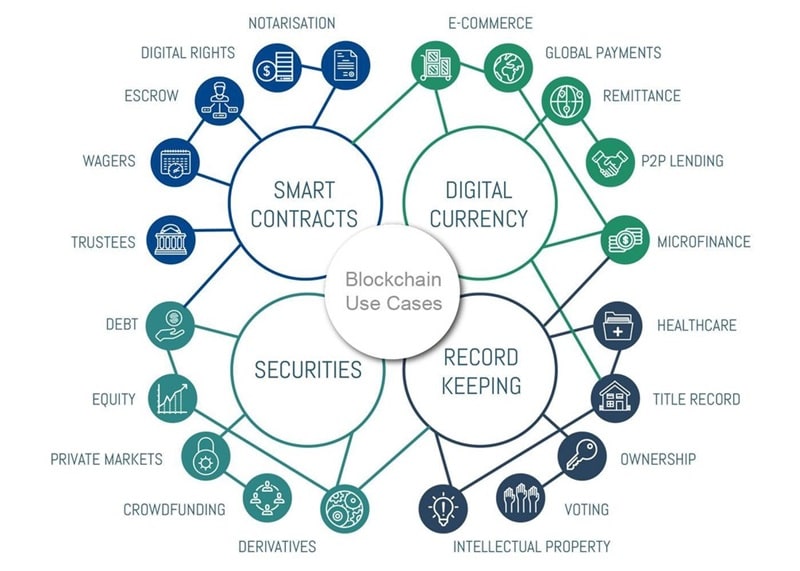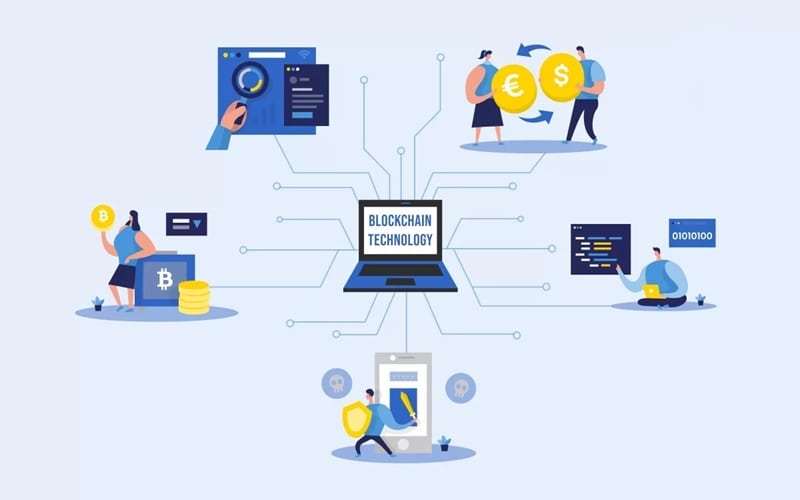Think you know all about Blockchain use cases? Think again. These 10 real-world applications are changing the game, from finance to supply chains to asset management and even governance. See how blockchain is not just about crypto but is carving a path for a future where transactions are safer, faster, and more transparent. Get ready to discover how this tech is shaking up industries and making systems more reliable. Let’s dive into a world where blockchain does more than secure Bitcoin. Buckle up; it’s a thrilling ride through innovation!
Transforming Finance with Blockchain Technology
Democratizing Lending and Borrowing
Blockchain is changing how we lend and borrow money. It lets people deal with each other directly. No banks are in the middle. This is called peer-to-peer lending, and it’s simple and fast. Smart contracts make sure everything is fair and sticks to the rules. They are lines of code that run on blockchain.
Imagine needing money for a new bike. In the past, you’d go to a bank. Now, with blockchain, you can ask on the internet. People everywhere can lend you money. Smart contracts handle the agreement. You get your bike, and they get their money back over time. It’s a win-win!
Streamlining Cross-Border Payments
Paying someone in another country can be hard and slow. Banks take long and charge a lot. Blockchain is a game changer for cross-border payments. It skips the bank, so money moves faster and cheaper. A digital ledger records every step. This means you can track your money all the way. No surprises, no hidden fees.
Let’s say you want to send money to your cousin overseas. Before, you’d worry about fees and wait days. With blockchain, you send it directly. Your cousin gets it almost right away. Plus, everything is clear and secure. This is why blockchain is a big deal for sending money across borders.
Supply Chain Management Redefined by Blockchain
Achieving End-to-End Traceability
Track your stuff, easy! With blockchain, you know where it goes. Every step shows up. It’s like a magic path of breadcrumbs, but way better. Think simple. What was once hard to see, now clear as day. Each item gets a digital tag. This tag holds its whole life story. From start to shelf, it’s all there.
Why is blockchain good for tracking items? Because it’s a super book that never lies. Every person, every step, they all add to the tale. No mix-ups, no tricks. Only the truth. You got a phone? A tablet? Good. That’s all you need. Peek at the path, anytime, anywhere. And guess what? It’s super fast. No waiting, no holding. Just quick, pure info.
Imagine bananas on a boat, moving across the sea. Once they hit land, they travel by truck to a store near you. Old ways lose track. But blockchain keeps it tight. Each move, each switch, right there at your fingertips.
Shops love it, farmers love it. You will too. It makes it all easy. No secrets, no lost goods. Just smooth moves from farm to fork. Your apple? Scan it and see. From seed to store, follow it back. That’s power, that’s control. Blockchain does that. Plain and simple. Now, let’s beat the fakes.
Combating Counterfeit Goods
Fake stuff is a big mess. It hurts makers and buyers. But no more! Blockchain steps in, a hero in code. It’s a shield against the fakes, keeping things real. Here’s how. Each real item gets a unique sign, a seal of truth. This sign goes into the blockchain, a vault that’s never wrong.
You want a real deal? Check the sign. It’s there to show you: this is no fake. You see, fakes cost us all. They risk our health, our money. But not if blockchain can help it. It watches over the real. It locks out the fake. And that’s a win for everyone.
When a shirt, a pill, or a toy boasts that sign, you know it’s legit. No doubts, no fears. Blockchain sees it all, the bad and the good. It draws the line. And we all get to know where we stand. It’s like having a superpower, for buying only what’s real.
So, to sum it up, blockchain is a game changer. It keeps it clear, keeps it true. From little things to big, it’s changing how we trust. It’s not just talk; it’s real action. And in this world of ours, that’s something to hold on to.
Revolutionizing Asset Management with Smart Contracts
Simplifying Asset Tokenization
Asset tokenization splits ownership. It makes it easier to buy, sell, and manage assets. Using blockchain, we secure these digital tokens. They represent real-world items like art or property. Smart contracts make this process smooth and clear. Anyone can see who owns what. There are no mix-ups.
Tokenization opens doors, big time. Think about buying a piece of a rare painting. Before, that seemed impossible for regular folks. Now, blockchain’s digital ledger allows many people to own a part of that painting. This is huge for investments. More people can join in without too much cash up front.
It’s not just for art either. Real estate, cars, and even business shares – all can be tokenized. Blockchain keeps track of who holds the tokenized assets. It cuts out the middlemen like banks. So you do the deals straight with buyers or sellers. Less hassle, less cost, and super fast.
Automating Royalty Distributions
Royalties can be tricky. Musicians, authors, and creators often wait long for their earnings. Not any more, thanks to blockchain. Smart contracts identify who should get paid what. When someone buys a song or a book, the system auto-pays the creator.
Let’s say you wrote a hit song. Instead of chasing down every cent, a smart contract does the work. Once someone streams your tune, the contract splits the payment. You get your share; others get theirs. Fast, fair, and without errors. And since it’s on a blockchain, everyone can trust the process.
Artists and creatives rejoice. No more waiting, no more unfair cuts. Their talents get the rewards they deserve, when they deserve them. It’s a win-win for creators and fans alike. More money in pockets can mean more great music and art for everyone.
Blockchain and smart contracts are not trends. They’re changing how we think about owning and sharing. They put the power back in our hands. It’s a new day for managing assets, all thanks to blockchain magic.
Empowering Transparent Governance with Blockchain Solutions
Integrating Blockchain for Voting Systems
Imagine voting from your phone with no worries of fraud. With blockchain for voting systems, it happens. Your vote stays safe as a coded message. How? Each vote becomes a block, linked and locked with others. And boom! Tampering with one? You’d have to tamper with all, which, frankly, is not happening. This tech means more trust in voting. Countries are testing it right now. Estonia’s a frontrunner, showing the world it’s possible. If they can do it, why not elsewhere?
Enhancing Public Sector Accountability
Blockchain shines light on murky government processes. We’re talking blink-and-you-miss-it updates on spending. It’s like a special tower, letting everyone watch what’s going down town hall. Say the city’s building a park. Blockchain lets you track every dollar, easing those “where’s my tax money going?” worries. This isn’t a fancy future talk. It’s here, it’s happening. Dubai’s going big, aiming to be the first blockchain-powered government. Think less paper, less waste, and happy people knowing their leaders can’t fudge the books. If you ask me, that’s a win for everyone.
In this post, we’ve explored how blockchain is changing key areas like finance, supply chains, asset management, and governance. From making it easier to lend and borrow, to tracking items and stopping fake goods, this tech is making waves. It also helps manage assets smartly and makes governments clear and accountable.
To sum it up, blockchain tech isn’t just a buzzword; it’s a tool that’s reshaping how we handle money, track goods, manage assets, and even vote with trust. It’s an exciting time to watch these changes happen and see how they make our lives better. Keep your eye on blockchain—it’s here to stay and it’s just getting started.
Q&A :
What are the most prominent use cases of blockchain technology?
Blockchain technology has paved the way for a variety of applications beyond its initial use in cryptocurrency. Prominent use cases include enhancing supply chain transparency, enabling secure and tamper-proof voting systems, and streamlining cross-border payments. Its decentralized and immutable ledger also supports smart contracts for automating legal and business agreements, as well as identity verification processes that provide secure online identification methods.
How is blockchain transforming the finance industry?
The finance sector is experiencing a significant transformation thanks to blockchain technology. It facilitates faster and more secure transactions with its decentralized ledger, cutting out intermediaries like banks, which can reduce fees and processing times. Blockchain also provides a foundation for the creation and exchange of digital assets, including cryptocurrencies and tokenized securities. Moreover, its inherent transparency and immutability enhance trust among participants, a critical factor in financial operations.
Can blockchain be used for data security and privacy?
Yes, blockchain is increasingly being adopted for enhancing data security and privacy. Its structure enables the creation of secure, encrypted data storage solutions that are resistant to unauthorized changes and hacks. The decentralization aspect of blockchain means no single entity has control over the entire dataset, reducing the risk of data breaches. In addition, it supports the creation of private blockchains and the use of permissioned ledgers, allowing better management of who has access to sensitive information.
What are the advantages of using blockchain for supply chain management?
The integration of blockchain into supply chain management offers numerous advantages, such as increased transparency, traceability, and efficiency. With blockchain, every transaction or movement of goods can be recorded on a tamper-proof ledger, making it simpler to verify the authenticity and origin of products. This transparency helps in reducing fraud, errors, and the likelihood of counterfeit goods. Blockchain also assists in automating various supply chain processes with smart contracts, potentially reducing delays and lowering costs.
How does blockchain support the concept of smart contracts?
Smart contracts are self-executing contracts with the terms of the agreement directly written into code and stored on the blockchain. Blockchain supports smart contracts by providing a secure and immutable platform that ensures the contract will execute exactly as programmed—without the need for intermediaries. This can streamline business operations, reduce dispute instances, and provide a transparent mechanism for agreement fulfillment, ultimately leading to increased trust and efficiency in various transactions and processes.



RELATED POSTS
Decentralized Learning Unchained: Navigating the Blockchain Education Revolution
"How do decentralized learning platforms...
Blast Airdrop – Tips for Earning KRO Tokens Easily
Earning KRO tokens from the...
Dunes Airdrop – Optimizing liquidity from resting assets
Dunes Airdrop brings a solution...
What are the benefits of blockchain: How It Transforms Business and Daily Life
Discover the benefits of blockchain...
What can you get with leetcoins? Discover now!
What can you get with...
Unlocking the Future: Top Benefits of Using Blockchain Technology
Benefits of Using Blockchain Technology:...
Blockchain Backlash: Uncovering the Environmental Footprint
The Environmental Impact of Blockchain:...
Blockchain Breakthroughs: How Is Blockchain Used In Healthcare
Blockchain technology revolutionizes healthcare with...
Distributed Ledger Technology vs Blockchain – A Comparative Analysis
Have you ever wondered about...
Blockchain Security Audit Reports: Safeguard Your Digital Assets Now
Get expert insights on blockchain...
Unveiling the Blockchain Explorer: Your Ultimate Guide to Crypto Navigation
What is a Blockchain Explorer?...
Benefits of Trustless Transactions: The Future of Secure Exchanges?
Discover the economic advantages of...
Blockchain Security Audits: Essential Shields Against Cyber Threats
Understanding the Importance of Blockchain...
Peer-to-Peer Learning Unlocked: Harnessing Blockchain for Collaborative Education
Blockchain's role in peer-to-peer learning:...
Challenges of Blockchain in Education: Overcoming the Digital Divide
Explore the challenges of blockchain...
Identity Management and Compliance Solutions: Navigating the Maze of Modern Security
Identity management and compliance solutions...